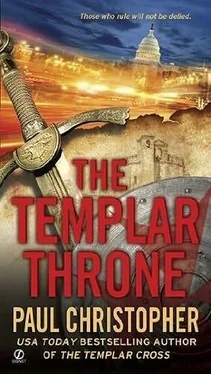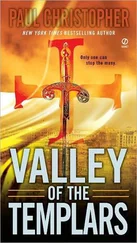Paul Christopher - The Templar throne
Здесь есть возможность читать онлайн «Paul Christopher - The Templar throne» весь текст электронной книги совершенно бесплатно (целиком полную версию без сокращений). В некоторых случаях можно слушать аудио, скачать через торрент в формате fb2 и присутствует краткое содержание. Жанр: Триллер, на английском языке. Описание произведения, (предисловие) а так же отзывы посетителей доступны на портале библиотеки ЛибКат.
- Название:The Templar throne
- Автор:
- Жанр:
- Год:неизвестен
- ISBN:нет данных
- Рейтинг книги:4 / 5. Голосов: 1
-
Избранное:Добавить в избранное
- Отзывы:
-
Ваша оценка:
- 80
- 1
- 2
- 3
- 4
- 5
The Templar throne: краткое содержание, описание и аннотация
Предлагаем к чтению аннотацию, описание, краткое содержание или предисловие (зависит от того, что написал сам автор книги «The Templar throne»). Если вы не нашли необходимую информацию о книге — напишите в комментариях, мы постараемся отыскать её.
The Templar throne — читать онлайн бесплатно полную книгу (весь текст) целиком
Ниже представлен текст книги, разбитый по страницам. Система сохранения места последней прочитанной страницы, позволяет с удобством читать онлайн бесплатно книгу «The Templar throne», без необходимости каждый раз заново искать на чём Вы остановились. Поставьте закладку, и сможете в любой момент перейти на страницу, на которой закончили чтение.
Интервал:
Закладка:
Senator Sinclair sighed; he'd seen his mother in this mood before. He remembered an embarrassing incident at basketball tryouts that had made him the punch line of a hundred jokes at Exeter. He sighed again and fingered his alumni tie. It was remarkable how easy it was for his mother to get under his skin.
"Why in God's name is this so important to you, Mother? Don't you think I can become president on my own?"
"Not without the help of the order, dear. With the order at our backs we can get the best of everything; we can bring the whole world over to our way of thinking. The order has unlimited resources; with you at the head we would be unbeatable."
"I'm not even sure I want to run, let alone win," said the senator, feeling the tuna sandwich making its mayonnaise-heavy way through his digestive system.
"Of course you want to be president, Richard," said his mother, looking up and staring around the lavishly decorated dining room. "Everyone wants to become president of the United States. It's the fulfillment of a lifetime dream. It was your father's dream. And mine."
Not my dream, thought Richard Sinclair.
"Yes, Mother," he said.
"Good," said Katherine. "That's settled then. Let's have dessert, shall we? Perhaps the peach cobbler with a little ice cream?"
"Yes, Mother."
21
They reached Mull shortly after one thirty in the afternoon, ditched the boat and managed to find a taxi in Fionnphort to take them to Tobermory and the little seaplane port on the bay. From there they took a Cessna Caravan to Glasgow and managed to catch a direct flight via Air Transat to Pearson International in Toronto.
By that evening, hungry and a little tired, they were half a world away from the sacred Isle of Iona and booking themselves into the Royal York, a twenty-eight-story chateau-style edifice from the twenties with more than a thousand rooms and its own apiary capable of producing seven hundred pounds of honey a year, or so said the brochure.
Once upon a time it had been the largest hotel in the British Empire and came by its "royal" name honestly, having hosted three generations of the Royal Family on a number of occasions, from the Duke of Windsor to Princess Diana, with a few proper kings and queens in between.
The hotel also had the advantage of being directly across the street from Toronto's old Union Station, a monstrous granite leftover from the Grand Central era that looked more like the British Museum than the British Museum did. There were trains departing for Montreal throughout the day and an evening overnight train to Halifax.
Despite the paranoid "ultra-surveillance" movies loved by Hollywood, Holliday knew that in reality you didn't retask satellites to look for people like them in places like Toronto, and tracking credit cards wasn't as simple as it looked for Jason Bourne and his ilk. Holliday gave them at least a couple of days' grace before whoever was tracking them got their bureaucratic ducks in a row. Taking the train would confuse things even more, especially if they paid for their tickets in cash. Before that, however, Holliday had an old friend to see.
Steven Braintree, a professor of medieval history at the University of Toronto, had an office on the top floor of a neo- Corinthian building at the corner of Bloor Street and Avenue Road that looked more like an old-fashioned bank or insurance company than a university faculty building. Appropriately enough, the Royal Ontario Museum was located directly across the street. The Center for Medieval Studies building was one block west of the exact center of the city at Yonge and Bloor, the division of east and west, uptown and down.
Braintree's office was a free- form collection of stacks of books, scatterings of files and snowstorms of paper littered over every flat surface in the twelve-by-twelve room, filling sagging bookcases, overflowing from filing cabinets and seeping out of cardboard boxes on the floor. There was a plastic model of a knight in armor on the windowsill beside a dying aspidistra on the radiator with a single drooping purple flower. The flower still had its tag from the nursery and the knight's shield had been replaced by a Quidi Vidi beer bottle cap from the Newfoundland microbrewery of the same name.
The office was under the eaves of the old stone building and without air- conditioning. At this time of the year Toronto was usually as hot as New York. The grimy windows were glued shut with a hundred-odd years' worth of paint and a solid Scots-Presbyterian regard for keeping heat in over the winter.
Braintree was just about as wilted as the aspidistra on his radiator. He was wearing jeans and a Chaucer is my Homeboy T-shirt. His long dark hair was lank and stringy from the heat, with a few more streaks of gray since Holliday had last seen the man. Sitting at his desk, the professor stared owlishly at Holliday from behind a fashionable pair of dark plastic- framed glasses, his hands tented under his frowning mouth as he listened to the tale of Jean de Saint-Clair and the Blessed Juliana.
"The poem is certainly interesting," he murmured. "As you know, medieval codes and cryptography are something of a specialty with me."
"You think it's a code?" Meg asked.
"It's awkward enough to be one," said Braintree, glancing at the red-haired nun. "One of the ways you can tell an old- fashioned code is through the awkwardness of its construction. The key words have to be there even though they don't really fit."
"Such as?" Holliday asked.
"It's mostly in the second verse," replied the young professor. He repeated the second stanza of the prayer aloud, emphasizing what he felt were the key words:
"Save us from Satan's royal vengeance once more / And give us Mary's holy wings to fly / Us to the farther sable shore / Then we shall keep thy treasures safe / In Arcadia's pale enclosing arms once more." He shook his head. "It's just not right." He turned away and started rummaging through a toppling pile of books on the floor behind him.
"What do you mean?" Meg urged. "It's just not right?"
"According to you this was written in the early thirteen hundreds. About the time of the Lay of Havelock the Dane."
"Who?" Meg asked.
"What," corrected Braintree. He pounced on a thin book bound in pale brown buckram. "Aha!" he said. "The Clarendon Press edition, 1910. Quite valuable. Thought I'd misplaced it."
"What?" Holliday said.
"Exactly," said Braintree. "I thought I said that already. The Lay is a what not a who."
"What does it have to do with our prayer?" Meg asked, frustrated.
"As I said, it's awkwardly constructed. Poetry, songs, prayers, verse of any kind was almost always written in eight-syllable rhymed couplets, like the Lay of Havelock the Dane, or Chaucer." He grinned, sticking out his chest, and recited, "Bot I haf grete ferly that I fynd no man / Dat has written in story how Havelock his lond wan."
"Easy for you to say," Holliday said and laughed. Middle English had never really been his thing.
"It's about a Danish prince who settles in the town of Grimsby in England-his lond wan, so to speak. Shakespeare's source for Hamlet." Braintree cleared his throat. "The point is your Jean de Saint-Clair and this Blessed Juliana either didn't write your prayer at all or wrote it for purposes other than prayer."
"The original was in French," said Holliday.
"Doesn't matter," said Braintree. "Conventions in French poetry at the time were identical-rhymed couplets were the only way to go. If they actually meant it to be a proper prayer, that's the way it would have been written.
"And as I said before, some of the word associations are strained-'Satan' and 'royal' would never be used together unless there was some second meaning, as you suggested. Same with the farther sable shore. Sable is redundant; in French it means sand, all shores are sandy, at least in poetic terms.
Читать дальшеИнтервал:
Закладка:
Похожие книги на «The Templar throne»
Представляем Вашему вниманию похожие книги на «The Templar throne» списком для выбора. Мы отобрали схожую по названию и смыслу литературу в надежде предоставить читателям больше вариантов отыскать новые, интересные, ещё непрочитанные произведения.
Обсуждение, отзывы о книге «The Templar throne» и просто собственные мнения читателей. Оставьте ваши комментарии, напишите, что Вы думаете о произведении, его смысле или главных героях. Укажите что конкретно понравилось, а что нет, и почему Вы так считаете.











